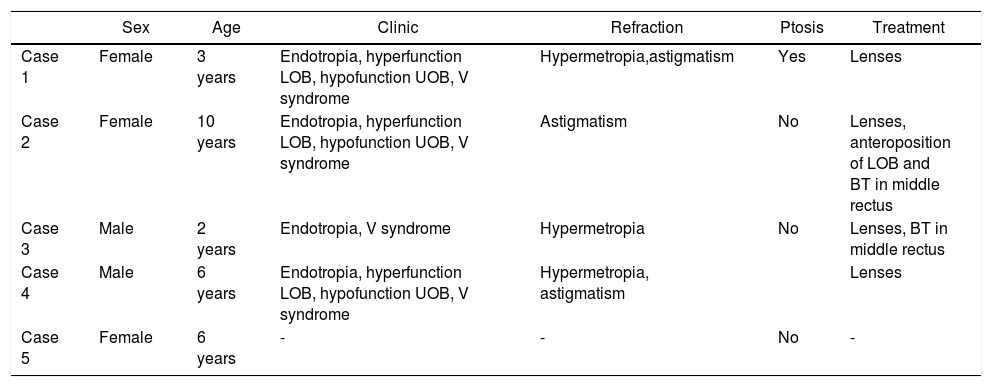Kabuki syndrome is a rare genetic disorder, caused by mutation in the KMT2D or KDM6A genes, which affects several organs in the majority of patients, among which are the eyes. The most typical clinical characteristics are mental retardation, postnatal growth retardation, skeletal anomalies, and characteristic facial features. As the eyes are affected in most of the cases, ophthalmological examination is recommended for the early detection of ocular anomalies, in order to prevent visual impairment. The most frequent ocular signs are strabismus, ptosis, and refractive anomalies. A series of cases of Kabuki Syndrome is described in five children, four of whom exhibited strabismus with esotropia, over action of inferior oblique muscles, and under action of superior oblique muscles associated with a V pattern. Most published papers do not report or might underestimate the ocular problems.
It may be appropriate to perform orbital resonances in order to detect changes in the muscle paths that are related to the pathology of the eye movements found.
El Síndrome de Kabuki (SK) es una enfermedad genética rara debida a una mutación genética en los genes KMT2D y KDM6A, que afecta a múltiples órganos, entre ellos los ojos, en la mayoría de los pacientes. Las características clínicas más típicas son: facies peculiar, baja estatura, anormalidades esqueléticas y bajo coeficiente intelectual. Las manifestaciones oculares más frecuentes son el estrabismo, la ptosis y los defectos refractivos. Presentamos una serie de casos, de cinco pacientes (3 mujeres), cuatro de ellos con estrabismo en forma de esotropía, hiperacción de oblicuos inferiores e hipofunción de oblicuos superiores asociado a un síndrome V. Son pocos los casos reportados de SK que describan las afectaciones oftalmológicas y las estrabológicas. Podría ser conveniente la realización de resonancias orbitarias para detectar cambios en los trayectos musculares que estén relacionadas con la patología de los movimientos oculares encontrados.










